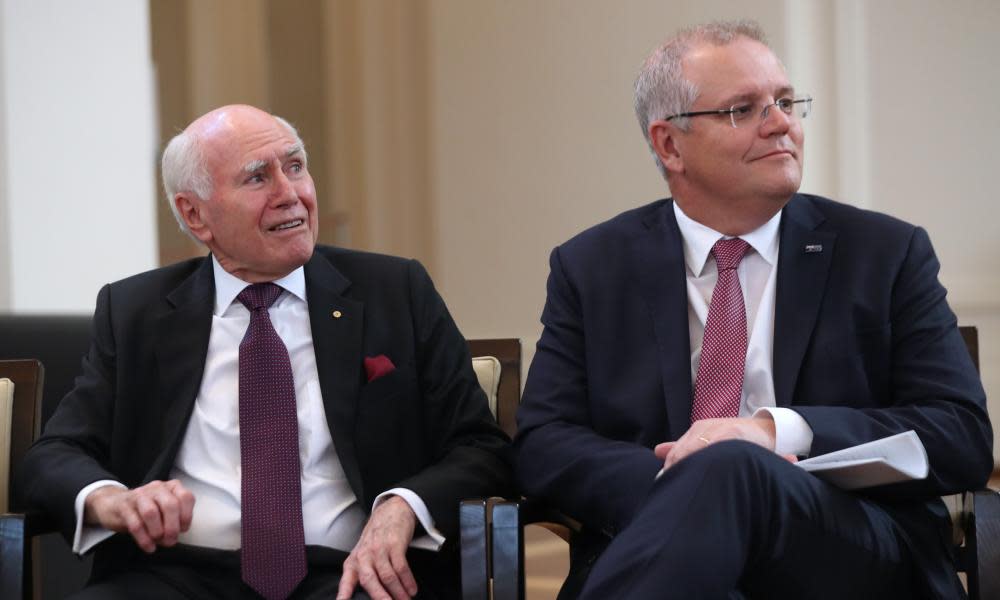I marched against John Howard but he showed leadership in a way Scott Morrison is refusing to

I grew up in Sydney but when my plane I landed there on Friday I did not recognise it.
Unprecedented, out-of-season bushfires have ravaged my home state of New South Wales over the past month. Reports say 20% of bushland has burned. Millions of hectares. People are dead, homes burned to the ground, wildlife has perished in the flames. From the plane we watched a wall of forest-eating fire burn its way forwards. Before we landed our cabin was full of smoke.
An ash haze hangs over the 5 million residents of Australia’s biggest city but the most disturbing thing about it isn’t the red sun or the thick yellow sky.
It’s that Sydney people have got used to it.
At the airport you could tell the difference between who was leaving and who was staying. People who’d just arrived were slow and still, glaring at the unrecognisable yellow world through the windows. People leaving were drinking white wine and shopping. I walked across town to get to a meeting and, not far from the Guardian office, I saw two people smoking outside their building.
Related: Revealed: 'monumental' NSW bushfires have burnt 20% of Blue Mountains world heritage area
It’s the dryness in the air that’s stretched out Australia’s fire season to the once-unimaginable edges of spring. On Saturday I went out to Gunning, in central NSW, for a wedding on a family sheep station. The town is one – like 99.8% of NSW – that since the year began has experienced drought.
The photos I took were terrifying. The grass is barely yellow, the soil underneath it bright white. If the fires are a moment-by-moment crisis, what’s happening on the farms is a slow-moving catastrophe. I was staying with a family of wool farmers whose sheep are suffering.
Whether in the city or country, the word you hear repeated is “apocalyptic”.
The same day I landed in Sydney, the NSW Liberal premier, Gladys Berejiklian, was not by the firefront. She was not lending her presence to crisis centres, issuing updates, involving herself in the business of leadership during an emergency. The premier of the state opened a zoo in western Sydney, promising it would be a tourist attraction and job creator.
Photographs of the event were surreal to the point of paradox – there were photos of giraffes under that glowing brown sky. Who the bloody hell would want to be there?
Similarly, the prime minister, Scott Morrison, is fronting no round-the-clock performance of care. On Thursday night he attended a party in Sydney at the mansion of Lachlan Murdoch, billionaire son of Rupert, the billionaire.
A zoo opening and mansion soirees are something of a contrast to what Australians have come to expect of leadership in a crisis. The former Queensland Labor premier, Anna Bligh, is not much loved now as a spiv for the banks but there is no one who could deny the depth of her leadership during the Queensland flood crisis. Similarly, even people like me – memorably blooded by the constabulary in the streets while protesting against the prime ministership of John Howard – remain grateful for the leadership shown by him in the aftermath of the massacre at Port Arthur.
Related: The Coalition isn't being honest about the climate crisis. But neither is Labor | Greg Jericho
Amid so much panic and grief and outrage, the moral stance taken by Howard advancing restrictive, necessary gun laws created a moment – and a legacy – of truly unifying national pride.
Climate denialism has characterised the policy frameworks of both the Berejiklian and Morrison governments. It’s valid to speculate their lack of meaningful engagement during these crises has been strategised to minimise exposure to questions about political culpability.
But a leader at a Murdoch do is hardly a leader in hiding. Photo ops at zoo parties are not what it means to go to ground. Leading to a fair conjecture, that rather than heed the Howard or Bligh example, Morrison and Berejiklian seem to have adopted Ronald Reagan’s famous quote that the “most terrifying words in the English language are: I’m from the government, and I’m here to help”.
Is the zealotry to not merely shrink government but to erase it from people’s expectations? Their absence from ongoing crisis management is not careless. It is adamant. It is wilful. There are photographs.
“I think the drought’s made a lot of farmer’s believe in climate change,” said a farmer at the wedding in Gunning to me. “I’ve seen droughts but no one’s ever seen anything like this.”
On the couch at the house was copy of the Land newspaper, with the photo of the desperate farmer among those protesting about the Murray-Darling water crisis in Canberra, demanding of the inactive deputy prime minister, “Where’s your passion?”
Where, indeed.
In the context of revelations about Berejiklian’s cuts to fire services and national parks, what’s emerged from the ashes of NSW is a dreaded realisation that in the charred remains of the state is the neoliberals’ small government endgame.
If there is no government help, there is just no help. It’s up to us to decide if this is a powerlessness we want to get used to.
You know, before everything we value burns down.
• Van Badham is a Guardian Australia columnist

 Yahoo News
Yahoo News 
